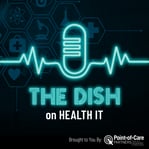Inside Peek at Kaiser Permanente’s Health IT Playbook
In this episode of The Dish on Health IT, host and CEO of POCP, Tony Schueth and senior consultant & payer interoperability expert, Kendra Obrist, sit down with Rob Alger, SVP of Health Plan Technology at Kaiser Permanente, for a candid and sweeping conversation about payer interoperability, AI, FHIR, and the realities of health IT innovation at scale.
Rob kicks things off by discussing Kaiser Permanente’s unique care and coverage model, highlighting how it streamlines internal coordination and shapes investment priorities. He notes that unlike many other health plans, Kaiser’s vertically integrated structure allows for fewer administrative hurdles, particularly in areas like prior authorization.
The conversation then turns to CMS-0057. While Rob acknowledges Kaiser must comply like everyone else, the regulation presents less of a lift for them due to their internal alignment. That said, he and Kendra agree: the success of any interoperability initiative hinges on provider adoption, which remains uncertain.
Looking ahead to 2025, Rob shares Kaiser’s strategic focus on simplifying healthcare experiences, especially by leveraging AI to remove friction from both clinical and administrative processes. One standout example is their ambient listening tool from Abridge, now rolled out across 40 hospitals and 600 medical offices, which is allowing clinicians to focus more on patients than keyboards. It’s one of the fastest clinical tech adoptions Rob’s ever seen.
Naturally, the discussion shifts to FHIR. Rob puts it plainly: “FHIR is non-negotiable.” Regulatory mandates have solidified its role, but he wonders whether the industry will eventually want to use FHIR or just continue reacting to policy. Kendra and Tony weigh in, noting signs of growing pull once organizations recognize the potential. They agree that multi-stakeholder efforts like Da Vinci Project and FHIR at Scale Taskforce (FAST) are helping to build real-world traction by solving for shared use cases.
When asked why Kaiser stays engaged in these initiatives, Rob makes it clear it's about shaping standards early, staying ahead of the curve, and making smarter, future-proof decisions, especially when it comes to vendor selection.
The episode then revisits AI, with Rob outlining Kaiser’s guiding principles: human in the loop, bias mitigation, and responsible governance. He explains that while Kaiser isn’t trying to build every tool themselves, they aim to be excellent adopters, using AI to free up clinicians and call center reps to operate at the top of their license. It's less about chatbots and more about smarter workflows, ambient data capture, and preserving session context across modalities.
Data quality surfaces as a recurring theme. Kendra highlights increasing payer interest in tackling inconsistency and fragmentation. Rob acknowledges Kaiser has an edge due to its standardized EHR system, but insists no one is immune to the challenges, especially when AI is in the mix. As he puts it, “If your data’s not clean, you’re not going anywhere.”
As a member of the Council for Affordable Quality Healthcare (CAQH) board, Rob brings a unique perspective on industry-wide infrastructure and collaboration. He explains that CAQH, originally formed by major health plans to tackle non-competitive operational challenges, has evolved into a key player in both standards development and practical solutions like coordination of benefits and provider directories. That dual focus—advocacy and action—resonates throughout the conversation, especially as Rob underscores the importance of shared investments in foundational infrastructure that lift the entire industry.
The discussion then touches more specifically on directories and the potential of shared infrastructure for non-competitive areas of healthcare. Rob emphasizes that while payers care deeply about directory accuracy, the solution likely involves more human accountability than tech alone.
In closing, the trio shares their perspectives on under-discussed industry challenges. Rob flags cybersecurity as a growing threat, especially in light of recent ransomware attacks. Kendra and Tony shine a light on consent and pharmacy interoperability, two areas that, while not headline-grabbing, could unlock major gains in care coordination and equity.
Rob’s parting call to action? It’s time for the industry to align on clinical policy. Competing on utilization rules isn’t sustainable, and getting consensus on what’s appropriate care could help streamline prior auth and improve patient trust.
Kendra wraps by urging payers to suspend disbelief and start planning for a world where APIs and data exchange work as intended. Dream a little, and then build accordingly.
Subscribe to The Dish on Health IT on Apple Podcasts, Spotify, or your preferred platform. The podcast is also available on HealthcareNOW Radio. Full video versions are also available on POCP’s YouTube channel. As always, health IT is a dish best served hot.





